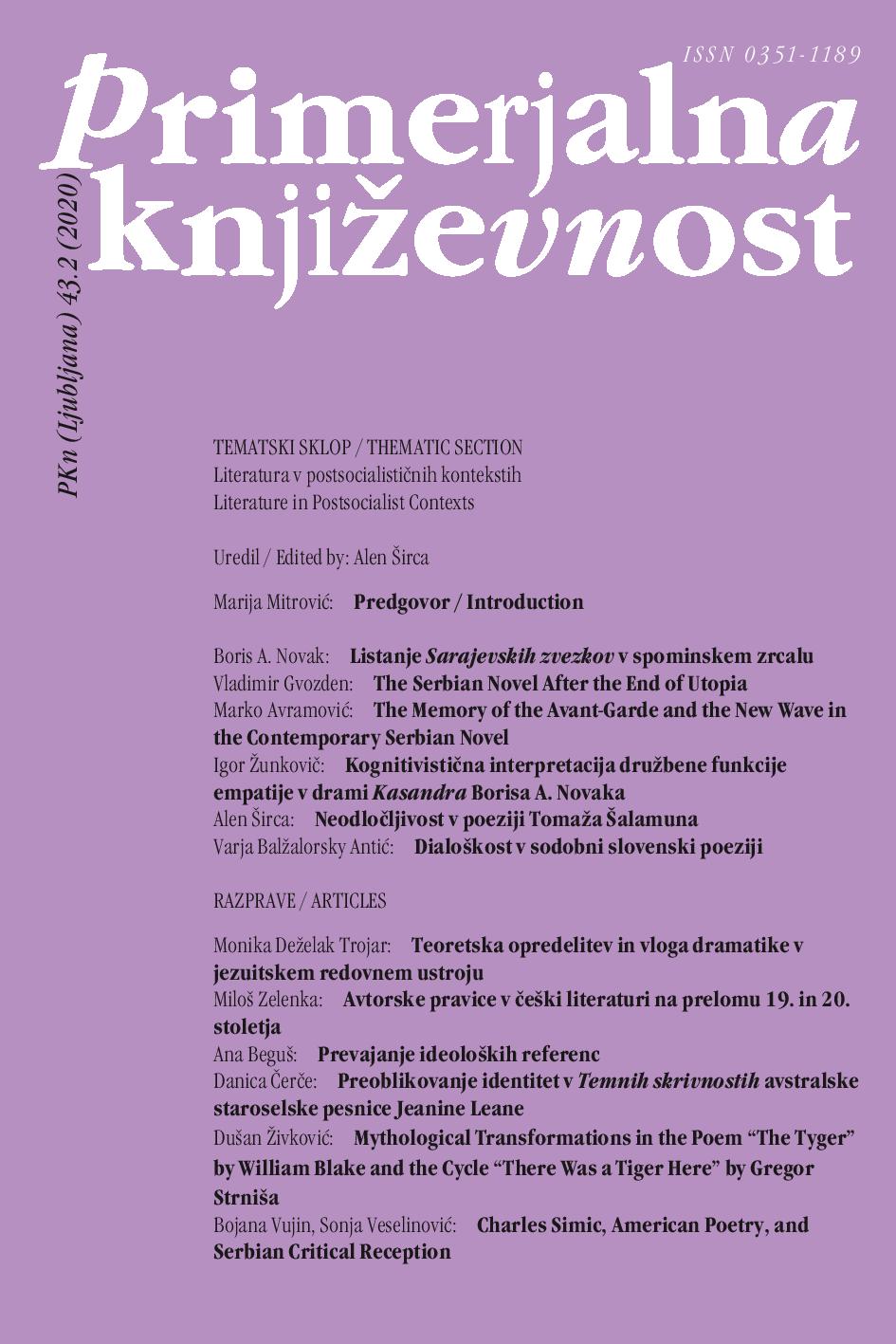A Cognitivist Interpretation of the Social Function of Empathy in the Play Cassandra by Boris A. Novak
DOI:
https://doi.org/10.3986/pkn.v43.i2.04Keywords:
Slovenian drama, cognitive literary criticism, empathy, trauma, Novak, Boris A.: CassandraAbstract
Boris A. Novak’s Cassandra was created after the author’s experience of the Balkan wars, so it is not surprising that it includes a socio-critical perspective. Beyond the parallels between the author’s biography and his attitude to war, the emergence of war trauma and its resolution in a post-socialist mental context is highlighted. The solution proves interesting, because of its unexpectedness and exceptionality on the one hand, and on the other with its focus on the subjective aspect of reconciliation. In this paper, based on the theoretical underpinnings of cognitive literary science and, particularly, the distinction between cognitive and emotional empathy, I analyze the circumstances, cognitive mechanisms, and social function of Cassandra’s decision to forgive Agamemnon. From an evolutionary point of view, it has an irritating effect at first, but from a personal point of view, it enables individual self-fulfillment through love. The fundamental dilemma of Novak’s drama is the following: is it possible, at the level of cognitive analysis, to justify either individual or collective overcoming of trauma in Cassandra’s way?
References
Dunbar, I. M. Robin. »Do Online Social Media Cut Through Constraints That Limit the Size of Offline Social Networks?« <em>Royal Society Open Science</em> 3.1 (2016). Tudi na spletu.
Fridl Jarc, Ignacija. »Tragičnost človekovega vedenja«. <em>Gledališki list SNG Drama Ljubljana</em> 80.10 (2000–2001): 33–35.
Gallese, Vittorio. »Neuroscientific Approaches to Intersubjectivity«. <em>The Embodied Self</em>. Ur. Thomas Fuchs, Heribert Sattel in Peter Henningsen. Stuttgart: Schattauer, 2011. 77–92.
Grdina, Igor. »Homerski svet – naš čas?« <em>Gledališki list SNG Drama Ljubljana</em> 80.10 (2000–2001): 15–18.
Gottschall, Jonathan. <em>Literature, Science, and a New Humanities</em>. New York: Palgave Macmillan, 2008.
Kermauner, Taras. »Eros kot absolutni smisel«. <em>Gledališki list SNG Drama Ljubljana</em> 80.10 (2000–2001): 12–14.
Koopman, Eva Maria in Hakemulder, Frank. »Effects of Literature on Empathy and Self-Reflection: A Theoretical-Empirical Framework«. <em>JLT</em> 9.1 (2015): 70–111.
Novak, Boris A. »Kasandra (tragedija)«. <em>Gledališki list SNG Drama Ljubljana</em> 80.10 (2000–2001): 41–76.
Novak, Boris A. »Moja Kasandra«. <em>Gledališki list SNG Drama Ljubljana</em> 80.10 (2000–2001): 6–10.
Novak, Boris A. <em>Dramski triptih</em>. Maribor: Litera, 2008.
Schuller, Aleksandra. »Kasandra: tragična eksistencialna odgovornost, ženski govor in žensko telo«. <em>Keria</em> 3.2 (2001): 103–123.
Schuller, Aleksandra. <em>Ženske dramske osebe in ženska bivanjska perspektiva v drami</em>. Doktorska disertacija. Ljubljana: FF UL, 2006.
Tomc, Gregor. <em>Geni, nevroni, jeziki</em>. Ljubljana: FDV, 2011.
Vrečko, Janez. »<em>Kasandra</em> Borisa A. Novaka in preroštvo«. <em>Poligrafi</em> 8.31–32 (2003): 191–205.
Vrečko, Janez. »Ignoranca preroštva v <em>Kasandri</em>«. <em>Gledališki list SNG Drama Ljubljana</em> 80.10 (2000–2001): 24–28.
Wege, Sophia. <em>Wahrnehmung – Wiederholung – Vertikalität: Zur Theorie und Praxis der Kognitiven Literaturwissenschaft</em>. Bielefeld: Aisthesis, 2013.
Žunkovič, Igor. <em>Evolucija in literatura</em>. Ljubljana: ZZFF, 2018.
Žunkovič, Igor. »Reprezentacija spola pri prejemnikih nagrade kresnik«. <em>Slavistična revija</em> 25.1 (2017): 183–198.


